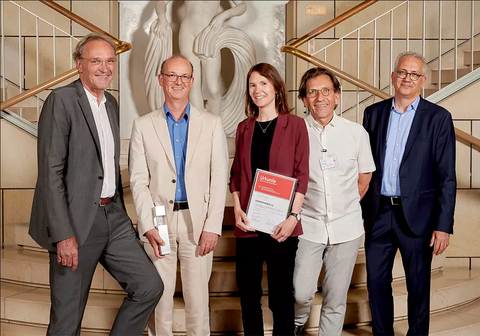Oct 05, 2023
Fourth Place for Makrophagen 2.0 at the Science4Life Start-up Competition

Makrophagen 2.0 team with Tarek Al-Wazir, Hessian Minister of Economics, and Prof. Jochen Maas, Managing Director Of Research And Development at Sanofi Germany. From left to right: Prof. Jochen Maas, Dr. Ludwig Englmeier, Dr. Anke Fuchs, Prof. Michael Sieweke, and Tarek Al-Wazir.
Makrophagen 2.0, a start-up initiative of researchers from TU Dresden is developing a new cell therapy using reprogrammed macrophages. The team was awarded an excellent fourth place at the Science4Life, Germany’s most prominent life science start-up competition.
“In recent years, immune therapies based on T-cells have revolutionized the treatment of blood cancers. Nevertheless, these types of therapies are largely ineffective against solid tumors that account for 90% of all cancers,” points out Professor Martin Bornhäuser, director of the Medical Clinic and Polyclinic I of the University Hospital Carl Gustav Carus.
“T-cells cannot enter solid tumors but a different type of immune cells – macrophages – have a natural ability to penetrate solid tumors,” explains Dr. Ludwig Englmeier who presented the business plan at Science4Life together with Dr. Anke Fuchs, research group leader and head of the cell production platform of the Center for Regenerative Therapies Dresden (CRTD). “The biggest challenge in using macrophages as immune therapy has been the inability to generate them in large numbers in the laboratory,” mentions Dr. Fuchs.
“Makrophagen 2.0 has now successfully overcome this challenge, paving the way to novel cancer therapies,” explains Prof. Michael Sieweke, whose research at the CRTD in Dresden and at the Centre dÌmmunologie de Marseille Luminy (CIML) in France uncovered the mechanisms that allow macrophages to be grown in the laboratory to clinically relevant numbers and presents the basis for the start-up. These self-renewing macrophages offer another significant advantage. “Our macrophages maintain a stable anti-cancer state and resist being converted to cells that support cancer growth,” explains Prof. Sieweke.
The Makrophagen 2.0 team was supported throughout their Science4Life journey by the SaxoCell precision therapy cluster. Prof. Bornhäuser, Prof. Sieweke, and Dr. Fuchs are all active within the SaxoCell initiative, leading research projects on living therapeutics.
“Being recognized as the fourth most-promising life science startup initiative in Germany provides us a lot of momentum to move forward. We are presented with a unique opportunity to develop a new type of cancer treatment, capitalizing on the extenssive research and profound expertise of Dresden’s researchers,” says Dr. Ludwig Englmeier who is responsible for business development.
